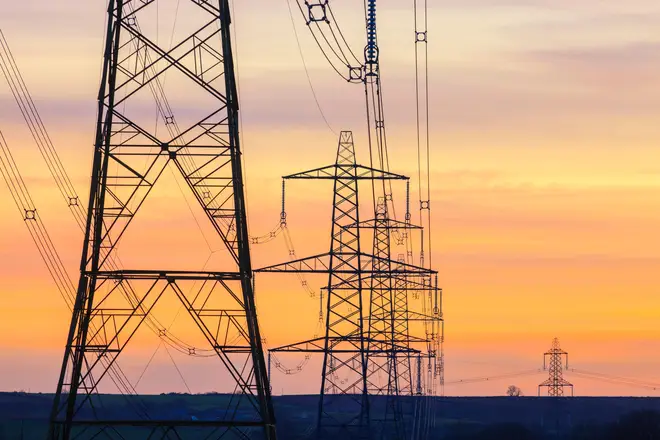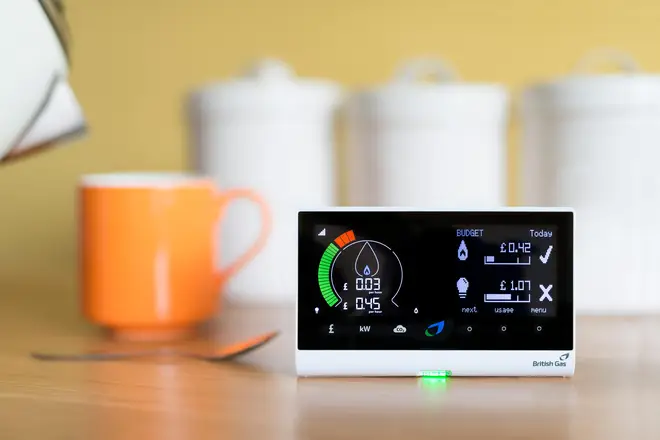
Paul Brand 10am - 12pm
4 November 2022, 14:27

Some households will be paid if they reduce their electricity usage during peak hours on some days this winter, after National Grid plans were given the go-ahead by the energy regulator.
Ofgem has approved the proposals for National Grid electricity system operator (ESO) to launch the programme, called a Demand Flexibility Service, from November until March.
The scheme is designed to control energy usage as Europe's gas supply continues to be impacted by the Russian invasion of Ukraine.
It is hoped it will reduce the possibility of blackouts at times when energy use is high.
The plans first require energy suppliers to sign up with the National Grid. So far the only energy supplier to do so is Octopus Energy, although Ovo has launched a smaller scheme that is not linked to National Grid's, but offers similar benefits.
Octopus Energy has also recently taken all of Bulb's customers, meaning all these households could also be given the option of joining the scheme.
It is understood other large energy firms are interested in taking part in the trial.

'Every move that we make, they want the money'
In the coming days, the ESO will seek to run the first tests for the service. There will be 12 test days in total to see how customers respond.
Households participating through the programme will be sent a message - 24 hours in advance - from their supplier if there is increased pressure on the system.
Read more: Millions face mortgage misery: What the Bank of England's interest rate rise means for you
It will ask people and businesses who have signed up to reduce or move their electricity usage outside peak hours.
Customers will then receive a discount if they reduce their electricity usage during the test - for example, by not using high-energy appliances such as tumble dryers.

The network operator, which revealed the service as part of efforts to avoid potential blackouts, has said households could save up to £100 through the limited scheme.
Watch: Andrew Marr: 'today's interest rate hike will come with a huge human cost'
Only customers with smart meters, whose energy supplies are signed up to the scheme, will be able to take part.
So far around 350,000 of the Octopus Energy's customers have signed up.
Your energy supplier will contact you if you are eligible.
The scheme is also available to some businesses.

Nick Ferrari cuts off Minister for not apologising for the mini-budget
Octopus Energy estimates that the system might be used around 13 times this winter to prevent shortages of energy on the grid.
With the 12 trial days, that means customers could be asked to restrict their energy usage on 25 days in total.
National Grid has not released any estimates.
Read more: When do pensioners get their cost of living payment 2022?
No one will be penalised for not taking part in the scheme.
Those who sign up can still use as much electricity as they want during peak hours, but they may not get the discount if they do.

The operator warned in its winter outlook that the first planned blackouts in decades might hit parts of the country this winter if power plants cannot get enough gas to keep running.
In what it called an "unlikely" scenario, the ESO said that households and businesses might face planned three-hour outages to ensure the grid does not collapse.
The Demand Flexibility Scheme aims to mitigate that risk.

'We've been like lab rats' to Trussonomics says Gary Smith
Fintan Slye, executive director of the ESO, said: "We are delighted that Ofgem have approved the use of our Demand Flexibility Service this winter.
"It will help mitigate the potential risks that the ESO has outlined in its Winter Outlook and will allow consumers to see a financial return for reducing their electricity use at peak times.
"As a responsible operator of the electricity system we have developed this innovative Demand Flexibility Service to compliment the robust set of tools we already use to balance the electricity system every day."
So-called demand-side responses have been touted by industry experts for years as an effective way of preventing blackouts and helping households use energy at times when wind turbines and solar panels are producing lots of energy.
In future the hope is that a household's smart meter can itself detect when there is a lot of cheap renewable electricity available, and at that point it can start charging the car, or heating the home.
The current set-up will likely not be automated for most households. Instead people will have to manually decide to put on their washing machine at a different time, or not plug in their electric car until later in the evening.